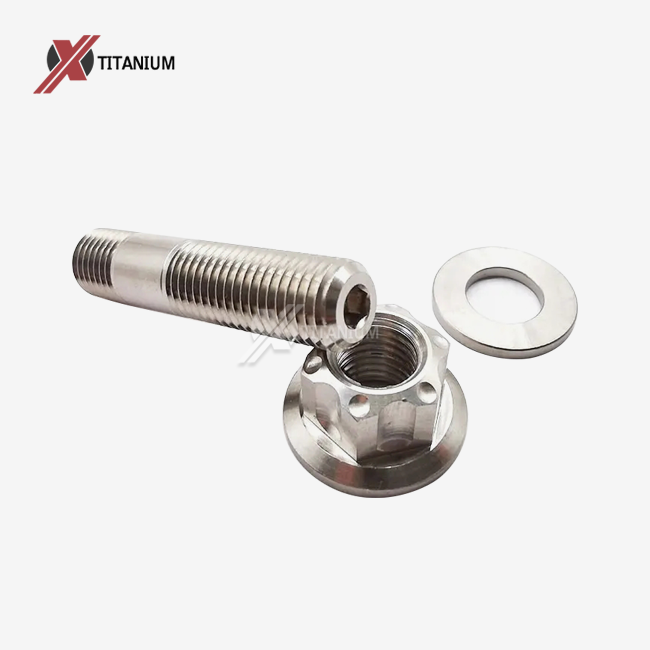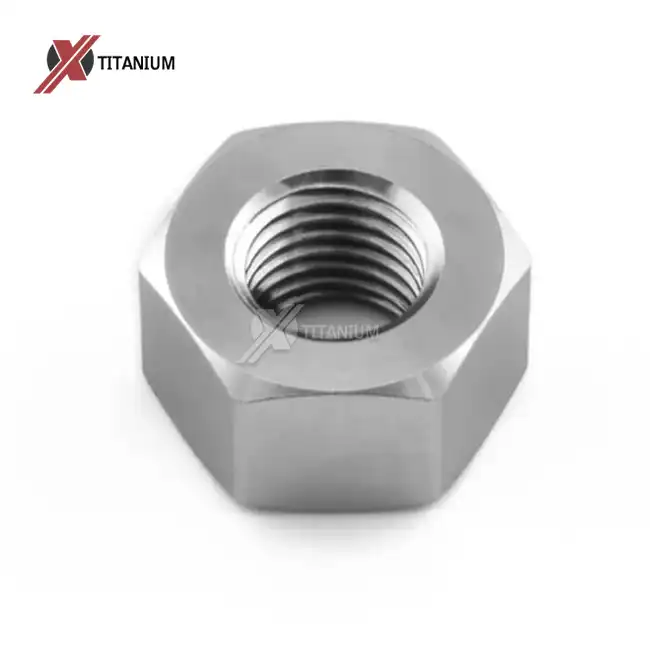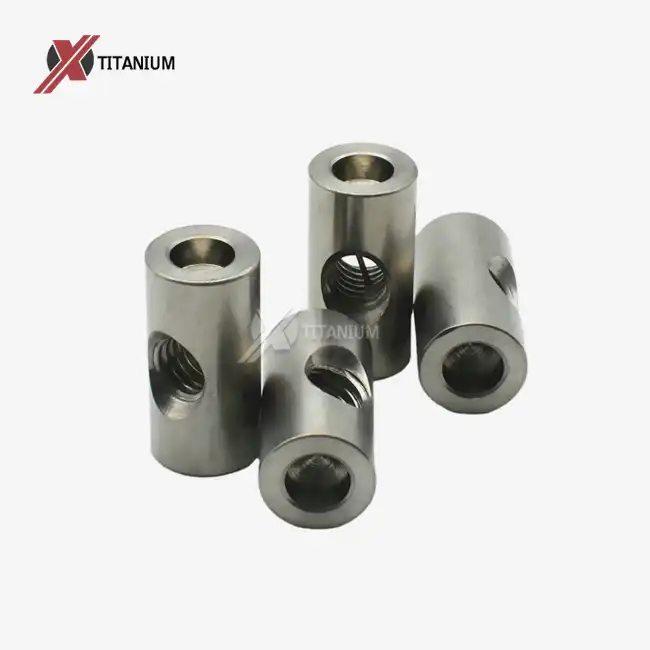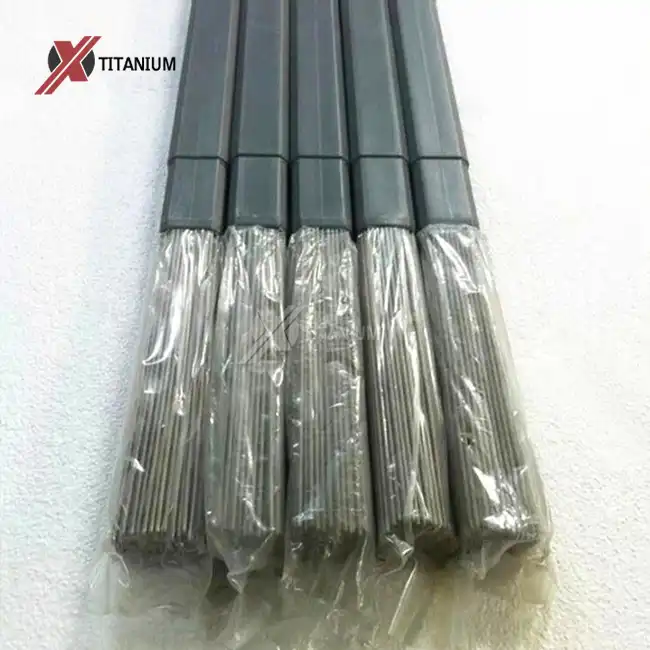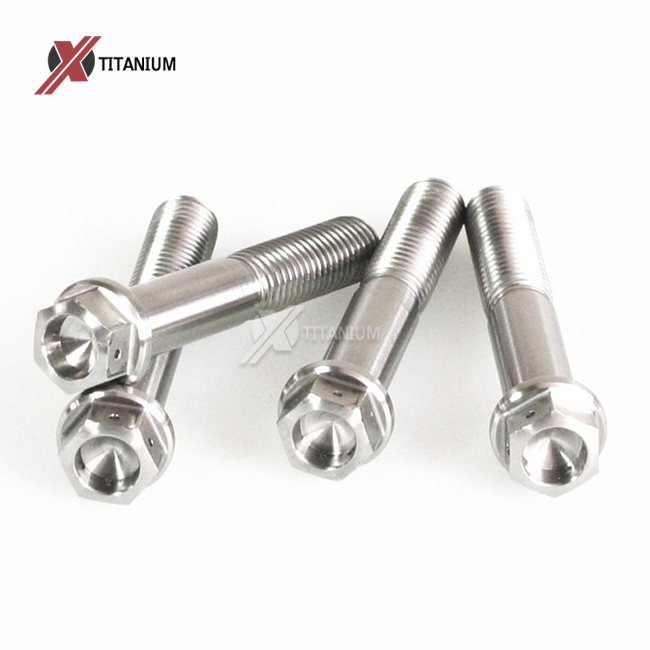The Revolutionary Properties of Titanium Exhaust Bolts in Aerospace Applications
Titanium exhaust bolts have emerged as a game-changing component in aerospace engineering, offering a unique set of properties that address many of the challenges faced in this demanding field. These specialized fasteners, crafted from premium-grade titanium alloys such as Ti-6Al-4V (Grade 5), boast an impressive array of characteristics that make them particularly well-suited for aerospace applications.
Unparalleled Strength-to-Weight Ratio
One of the most significant advantages of titanium exhaust bolts is their exceptional strength-to-weight ratio. In the aerospace industry, where every gram matters, these bolts offer the structural integrity of steel at a fraction of the weight. This characteristic allows engineers to design lighter aircraft without compromising on safety or performance. The weight reduction achieved by using titanium exhaust bolts can lead to improved fuel efficiency, increased payload capacity, and enhanced overall aircraft performance.
Superior Heat Resistance
Aerospace applications often involve exposure to extreme temperatures, particularly in engine compartments and exhaust systems. Titanium exhaust bolts excel in this environment, maintaining their strength and structural integrity at temperatures exceeding 600°C. This heat resistance is crucial for ensuring the longevity and reliability of critical aircraft components, reducing the risk of failure due to thermal stress or material degradation.
Exceptional Corrosion Resistance
The harsh conditions encountered in aerospace operations, including exposure to various chemicals, moisture, and atmospheric pollutants, can quickly degrade standard fasteners. Titanium exhaust bolts, however, offer outstanding resistance to corrosion and oxidation. This property not only extends the lifespan of the bolts themselves but also protects surrounding components from potential damage caused by corrosion products. The enhanced durability of titanium exhaust bolts translates to reduced maintenance requirements and improved overall aircraft reliability.
Integrating Titanium Exhaust Bolts into Aerospace Design: Challenges and Solutions
While the benefits of titanium exhaust bolts in aerospace applications are clear, their integration into existing and future designs presents both challenges and opportunities for innovation. Engineers and designers must carefully consider various factors to fully leverage the advantages of these advanced fasteners.
Overcoming Cost Barriers
One of the primary challenges in adopting titanium exhaust bolts on a wider scale is their higher initial cost compared to traditional steel fasteners. However, a comprehensive cost-benefit analysis often reveals long-term savings. The extended lifespan, reduced maintenance requirements, and potential fuel savings due to weight reduction can offset the higher upfront investment. Aerospace companies are increasingly recognizing the value proposition of titanium exhaust bolts, particularly for high-performance and long-range aircraft where the benefits are most pronounced.
Optimizing Design for Titanium Properties
Integrating titanium exhaust bolts into aerospace designs requires a shift in engineering approach. The unique properties of titanium, including its different thermal expansion characteristics and higher strength, necessitate adjustments in joint design, torque specifications, and assembly procedures. Engineers must optimize these designs to fully exploit the advantages of titanium while ensuring compatibility with existing systems and materials. This optimization process often leads to innovative solutions that further enhance aircraft performance and reliability.
Addressing Manufacturing and Installation Challenges
The production and installation of titanium exhaust bolts demand specialized knowledge and equipment. Titanium's high strength and resistance to deformation can make machining and threading more challenging compared to traditional materials. Additionally, the risk of galling during installation requires careful consideration of lubricants and installation techniques. Aerospace manufacturers are investing in advanced manufacturing technologies and training programs to overcome these challenges, ensuring the precise production and proper installation of titanium exhaust bolts.
The Future Landscape: Titanium Exhaust Bolts and Beyond
As aerospace engineering continues to evolve, titanium exhaust bolts are just the beginning of a broader shift towards advanced materials and fastening solutions. The integration of these high-performance components is paving the way for further innovations that promise to reshape the aerospace industry.
Emerging Technologies and Hybrid Solutions
Research and development efforts are exploring new frontiers in fastener technology, building upon the success of titanium exhaust bolts. Hybrid fasteners combining titanium with other advanced materials, such as carbon fiber reinforced polymers, are under development. These next-generation fasteners aim to offer even greater weight savings and performance benefits. Additionally, smart fasteners incorporating sensors for real-time monitoring of structural integrity are on the horizon, promising to revolutionize aircraft maintenance and safety protocols.
Expanding Applications Beyond Exhaust Systems
The victory of titanium debilitate jolts is motivating engineers to consider their application in other basic zones of flying machine plan. From landing adapt components to wing connections, the potential for titanium latches to improve execution and unwavering quality amplifies all through the flying machine structure. This extension of applications is driving advance inquire about into titanium combinations optimized for particular aviation necessities, possibly driving to a unused era of specialized clasp custom-made to assorted air ship frameworks.
Environmental Considerations and Sustainable Aviation
As the aviation industry hooks with natural concerns and the thrust towards economical flying, titanium debilitate jolts play a part in this broader activity. Their commitment to weight lessening and moved forward fuel proficiency adjusts with endeavors to decrease carbon outflows. Moreover, the toughness and recyclability of titanium adjust with lifecycle appraisal contemplations, making these latches a component of more ecologically mindful flying machine plan. The future may see expanded accentuation on the natural benefits of titanium latches as portion of comprehensive maintainability procedures in aviation building.
Conclusion
Titanium exhaust bolts represent a significant leap forward in aerospace engineering, offering a combination of strength, lightweight properties, and durability that is transforming aircraft design and performance. As the industry continues to push the boundaries of what's possible in aviation, these specialized fasteners are likely to play an increasingly critical role. The challenges of integration and cost are being steadily overcome, paving the way for wider adoption and further innovation.
As we look to the future of aerospace engineering, titanium exhaust bolts stand as a testament to the power of materials science in driving progress and efficiency in one of the world's most demanding industries. For those interested in learning more about titanium products and their applications in aerospace and beyond, please contact us at info@cltifastener.com or djy6580@aliyun.com. The journey of innovation in aerospace fasteners is ongoing, and titanium exhaust bolts are just the beginning of what promises to be an exciting era of advancement in aircraft technology.
